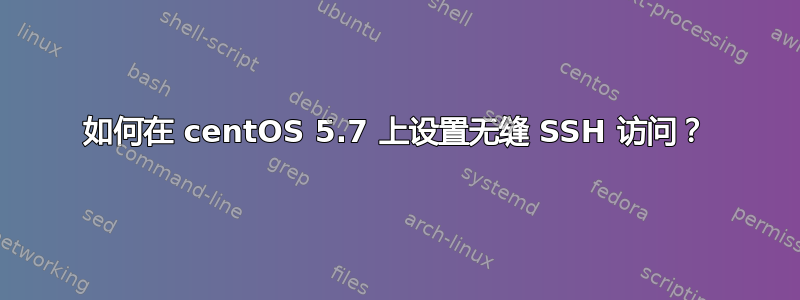
好吧,到目前为止我还没有这样做过,但我在远程服务器上创建了一个帐户,纯粹用于共享 git repo 访问,现在需要在每台开发机器上通过 ssh 设置无缝登录。我已经阅读了几篇关于此的文章,但是我在创建用户的帐户上没有 .ssh 文件夹,因此无法在 authorized_keys 文件中安装客户端密钥。我是否只需创建这些文件夹和文件即可安装密钥,因为我认为这不会那么简单。我正在关注此链接教程如下,目前 sshd_config 文件的状态如下。(当前为密码验证登录)。感谢您的指点。
# This is the sshd server system-wide configuration file. See
# sshd_config(5) for more information.
# This sshd was compiled with PATH=/usr/local/bin:/bin:/usr/bin
# The strategy used for options in the default sshd_config shipped with
# OpenSSH is to specify options with their default value where
# possible, but leave them commented. Uncommented options change a
# default value.
#Port 22
#Protocol 2,1
Protocol 2
#AddressFamily any
#ListenAddress 0.0.0.0
#ListenAddress ::
# HostKey for protocol version 1
#HostKey /etc/ssh/ssh_host_key
# HostKeys for protocol version 2
#HostKey /etc/ssh/ssh_host_rsa_key
#HostKey /etc/ssh/ssh_host_dsa_key
# Lifetime and size of ephemeral version 1 server key
#KeyRegenerationInterval 1h
#ServerKeyBits 768
# Logging
# obsoletes QuietMode and FascistLogging
#SyslogFacility AUTH
SyslogFacility AUTHPRIV
#LogLevel INFO
# Authentication:
#LoginGraceTime 2m
PermitRootLogin no
#StrictModes yes
#MaxAuthTries 6
RSAAuthentication yes
#PubkeyAuthentication yes
AuthorizedKeysFile .ssh/authorized_keys
# For this to work you will also need host keys in /etc/ssh/ssh_known_hosts
#RhostsRSAAuthentication no
# similar for protocol version 2
#HostbasedAuthentication no
# Change to yes if you don't trust ~/.ssh/known_hosts for
# RhostsRSAAuthentication and HostbasedAuthentication
#IgnoreUserKnownHosts no
# Don't read the user's ~/.rhosts and ~/.shosts files
#IgnoreRhosts yes
# To disable tunneled clear text passwords, change to no here!
#PasswordAuthentication yes
#PermitEmptyPasswords no
PasswordAuthentication yes
# Change to no to disable s/key passwords
#ChallengeResponseAuthentication yes
ChallengeResponseAuthentication no
# Kerberos options
#KerberosAuthentication no
#KerberosOrLocalPasswd yes
#KerberosTicketCleanup yes
#KerberosGetAFSToken no
# GSSAPI options
#GSSAPIAuthentication no
GSSAPIAuthentication yes
#GSSAPICleanupCredentials yes
GSSAPICleanupCredentials yes
# Set this to 'yes' to enable PAM authentication, account processing,
# and session processing. If this is enabled, PAM authentication will
# be allowed through the ChallengeResponseAuthentication mechanism.
# Depending on your PAM configuration, this may bypass the setting of
# PasswordAuthentication, PermitEmptyPasswords, and
# "PermitRootLogin without-password". If you just want the PAM account and
# session checks to run without PAM authentication, then enable this but set
# ChallengeResponseAuthentication=no
#UsePAM no
UsePAM yes
# Accept locale-related environment variables
AcceptEnv LANG LC_CTYPE LC_NUMERIC LC_TIME LC_COLLATE LC_MONETARY LC_MESSAGES
AcceptEnv LC_PAPER LC_NAME LC_ADDRESS LC_TELEPHONE LC_MEASUREMENT
AcceptEnv LC_IDENTIFICATION LC_ALL
#AllowTcpForwarding yes
#GatewayPorts no
#X11Forwarding no
X11Forwarding no
#X11DisplayOffset 10
#X11UseLocalhost yes
#PrintMotd yes
#PrintLastLog yes
#TCPKeepAlive yes
#UseLogin no
#UsePrivilegeSeparation yes
#PermitUserEnvironment no
#Compression delayed
#ClientAliveInterval 0
#ClientAliveCountMax 3
#ShowPatchLevel no
#UseDNS yes
#PidFile /var/run/sshd.pid
#MaxStartups 10
#PermitTunnel no
#ChrootDirectory none
# no default banner path
#Banner /some/path
# override default of no subsystems
Subsystem sftp /usr/libexec/openssh/sftp-server
答案1
更简单的方法
在您的源箱上,确保您已经生成了一个密钥,如果没有,请运行 ssh-keygen 来生成一个(例如:ssh-keygen -b 1024 -t rsa -q)
然后运行 ssh-copy-id -i .ssh/id_rsa.pub user@host
这将为您完成所有与 authorized_keys 无关的操作。不过,在较旧的发行版中,ssh-copy-id 命令不存在,您必须执行之前建议的其他方法。
答案2
是的,它(几乎)就是这么简单。以 ssh 服务器上的账户身份运行:
mkdir ~/.ssh
cat id_dsa.pub >> ~/.ssh/authorized_keys
其中 id_dsa.pub 是来自其中一台客户端机器的公钥。
为了安全起见,您可能希望执行类似 的操作chmod 700 ~/.ssh,尽管这对于 authorized_keys 的使用应该没问题。确保您的私钥(和您的 .ssh 目录)具有限制性权限。
如果您遇到问题,请-v在客户端上运行带有选项的 ssh 以获取调试信息,然后查看服务器的 ssh 日志(可能是 /var/log/auth.log 或 /var/log/secure 或类似的内容,具体取决于发行版)。


